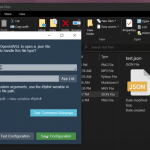Best Windows apps this week

Four-hundred-forty-eight in a series. Welcome to this week's overview of the best apps, games and extensions released for Windows 10 and 11 on the Microsoft Store and elsewhere in the past seven days.
Microsoft revealed this week that its DirectStorage API is coming to Windows 10 as well (not just Windows 11 as originally announced). The API improves game loading times on NVMe storage devices significantly.
Audacity says it is 'deeply sorry' for privacy policy fiasco, publishes lengthy update and explanation

The development team behind Audacity learned the hard way that people do not take kindly to the introduction of telemetry, particularly when communication is poor.
Over the last few months, there has been a very public debacle involving Audacity's proposed changes to its privacy policy. It resulted in the software being branded "possible spyware" and led to explanations, apologies and backtracking. Now the team behind the open source audio editor has published its updated privacy policy along with a lengthy explanation about various elements of it and an apology for the "significant lapse in communication".
Cyber attacks on council workers increase over 200 percent

Local councils have faced the same pressure as commercial businesses to have people working at home during the pandemic. But a new report shows attacks on UK councils' remote workers rose by 213 percent from March 2020 compared to the previous year.
Freedom of Information (FOI) requests made by technology solutions provider Insight, show that on average councils switched 74 percent of their employees -- more than double the UK average -- to remote working during the pandemic.
Microsoft releases Windows 11 Build 22000.100 (KB5004300) with visual improvements and other tweaks

Earlier in the week, Microsoft rolled out the first preview for Teams in Windows 11. This took the form of new Chat flyout from taskbar, as well as a Teams desktop experience designed to make the best use of the upcoming OS.
This addition is only available to some Windows Insiders, for now, but Microsoft has now released a new Windows 11 build for Insiders in the Dev Channel that comes with a number of visual improvements.
Windows 11's moving Start button messes with muscle memory and more

In many regards, the move from Windows 10 to Windows 11 is not a massive one. While there are undeniably a lot of changes and additions -- both visible and under the hood -- the operating system still looks, feels and functions much as it has done for years.
But while it may seem that there's not much to learn, there are still elements of friction that gripe in Windows 11. The redesigned context menu is a good case in point, dividing users into those who love it and those who hate it. And then there is the Start menu. Of course, there is a new look here, but that's not the problem.
How streaming can help developers improve their handling of data [Q&A]

Data is increasingly important to companies, but making effective use of it presents a number of challenges.
NoSQL database company DataStax has recently launched its new Astra Streaming service. Based on Apache Pulsar this aims to make it easier for developers who want to run their application streaming alongside their database instances like Cassandra.
Universal decryptor now available for REvil ransomware

It is now almost three weeks since the gigantic ransomware attack that exploited a vulnerability in Kaseya VSA remote management software. The attack affected millions of devices and the group behind it, REvil, had been demanding a $70 million ransom.
There had been great concern about the fall out from the attack due to the apparent disappearance of REvil which made it impossible for anyone willing to pay the ransom to do so. Now a universal decryption key has been obtained from a "trusted third party", giving victims the chance to regain access to their data without the need to part with any money.
OWC Envoy Pro SX is a rugged Thunderbolt 4 SSD for Windows and Mac

When disasters happen, such as a flood, it can be devastating to lose belongings -- especially expensive computers. While laptops and desktops can be replaced, the data housed on them often cannot. That's why it can be smart to back up your data to both the cloud and a rugged external drive. Redundancy is key to protecting your cherished photos, videos, and more.
Speaking of rugged external storage, today, OWC launches a very durable new portable solid state drive. Called "Envoy Pro SX," the Thunderbolt 4 SSD is insanely fast and is compatible with both Windows and Mac. More importantly, it is is built like a tank -- OWC says the drive is certified to not only be water resistant, but dustproof and drop-proof too. Nice!
The critical role of project scoping in advance of M&A data migrations

Every migration project has one nemesis -- the unknown. No matter what data you’re migrating, surprises can send a project spiraling. Projects that run on time and on budget demand a clarity of vision that comes from comprehensive pre-migration assessments and project scoping.
Assessments are the best way to map a project and discover what was previously unknown. Effectively visualizing the source and destination environments helps you plan and understand all the different elements of a project. Who are the people required? What technologies are involved? Will you need any third-party tools? The discovery that pre-migration assessments provide helps you understand the nature of the project and how best to complete it.
Why have we failed and what do we need to do?

In watching the most recent high profile, and very costly breaches, I’ve begun to ask the question "Why have we failed and what do we need to do?" We’ve failed. As I enter the twilight of my career in our industry, we haven’t gotten better -- breaches are more expensive, they’re more difficult to remediate, the economic destruction is real, and people get hurt or die as a result of cybersecurity breaches. Why? Where did we go wrong, and what do we need to do to fix it?
The first question I asked myself is, "What do we do well?" We’re an industry of incredibly talented people. Over the years, we’ve learned to collaborate and share information (which, we didn’t start off doing), and we have no shortage of tools. Our tool chest is loaded to the gills with capability. We also have boards and executives who are more cyber savvy than ever before. When I started in our industry over two decades ago, I couldn’t explain to a board what cybersecurity was with a PowerPoint presentation. Now, they’re all concerned about the issue and paying attention.
36 percent of organizations have suffered a serious cloud breach in the last year

A new survey of 300 cloud professionals finds that 36 percent of organizations have suffered a serious cloud security data leak or a breach in the past 12 months.
The study conducted by security and compliance automation firm Fugue and developer tools company Sonatype finds eight out of ten are worried that they're vulnerable to a major data breach related to cloud misconfiguration.
97 percent don't recognize the security limitations of containers

A new study finds that only three percent of respondents recognize that a container, in and of itself, is not a security boundary, suggesting that the default security capabilities of containers are overestimated.
The survey, from cloud security company Aqua Security of 150 cloud native security practitioners and executives from IT, Security and DevOps teams, across sectors and geographies, also shows that only 24 percent of respondents have plans in place to deploy the necessary building blocks for runtime security.
Satechi launches trio of USB-C GaN chargers

USB Type-C is amazing. This reversible USB connector is not just used for data connections, but power too. For instance, there are many laptops, tablets, and smartphones that charge using USB-C. When all of your devices use USB-C, it makes your life much easier -- there are fewer wires and chargers to deal with. Even better, you can potentially travel lighter by packing less. Hopefully Apple will eventually bring USB-C to the iPhone fully -- the company already has with some iPad models.
Today, Satechi launches a trio of USB-C chargers, and since they are of the GaN variety, they are very compact. While all three are similar, they are also quite distinct. All three have foldable prongs which makes them ideal for travel, but the number of ports and wattage varies. The 66W and 108W models both have three ports, but the 100W variant has only one.
Get 'Deep Learning for Beginners' ($27.99 value) FREE for a limited time

With information on the web exponentially increasing, it has become more difficult than ever to navigate through everything to find reliable content that will help you get started with deep learning.
This book is designed to help you if you're a beginner looking to work on deep learning and build deep learning models from scratch, and you already have the basic mathematical and programming knowledge required to get started.
Over half of exploits sold on underground forums are for Microsoft products

A new study from Atlas VPN shows that 51 percent of exploits sold on underground cybercriminal forums are for Microsoft products.
Microsoft Office exploits make up 23 percent while Windows accounts for 12 percent of exploits sold on hacker forums. Remote Desktop Protocol (RDP) exploits make up 10 percent, with Internet Explorer and Share Point taking three percent each.
© 1998-2025 BetaNews, Inc. All Rights Reserved. About Us - Privacy Policy - Cookie Policy - Sitemap.




